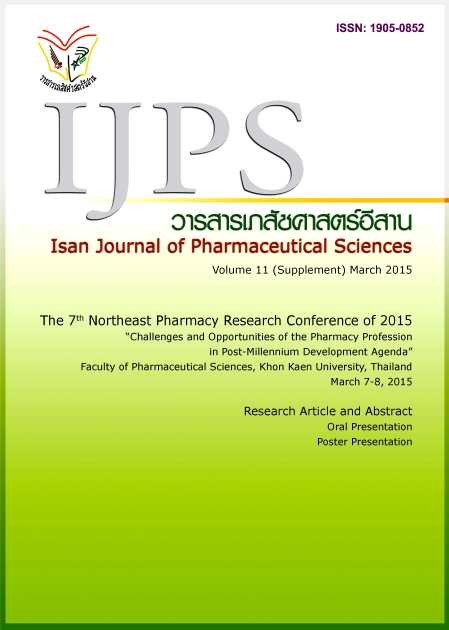The outcome of lifestyle modification program to exercise and eating behavior in people who risk to diabetes and hypertension.
Main Article Content
Abstract
Introduction: This research is Quasi–experimental research to study the outcome of Lifestyle Modification Program to exercise and eating Behavior in People Who Risk to Diabetes and Hypertension. Meterial and Method: The data collecting was performed on ≥ 18 years old people who were screened in Family Pharmacist Project by community pharmacy network during 1 June 2012 – 30 April 2013. The total of 32 peoples who were risk for diabetes and high blood pressure received Lifestyle Modification Program to reduce level of blood glucose and blood pressure for 8 weeks. The data collections about clinical outcome knowledge and exercise and eating Behavior were collected about life style modification at 1st, 2nd, 3rd and 8th week after received Lifestyle Modification Program. Results: It was found that the total of 32 people in this program was female 65.5 %, age 41- 50 years old 31.3 %. After Lifestyle Modification Program were found that exercise behavior after this program, regularly and continuously was significantly increased from 9.4 % to 53.1%, 59.4% and 84.4% at 2nd, 3rd and 8rd week follow –up respectively. Health behaviors and dietary behaviors after the program, found that people in this program strictly changed food behavior was significantly increased from 28.1% to 59.4%, 78.1 % and 84.4 % at 2nd, 3rd and 8rd week follow-up respectively. Conclusion: After lifestyle modification programe, the people Found that the people in this program have a positive changed in behavior after the program.
Article Details
In the case that some parts are used by others The author must Confirm that obtaining permission to use some of the original authors. And must attach evidence That the permission has been included
References
Aekplakorn W. (2009). A Risk Score for Predicting ncident Diabetes in the Thai Population [online]. Accessed 6 September 2009. Available from http://care.diabetesjournals.org/content/29/8/1872. Abstract.
Banklang A. (2011). Diabetes Prevention attitude among government and state enterprise employees with prediabetes in Muang District, Khon kaen Province. [Thesis]. Faculty of nursing. Collage of Asian Scholar. Khon kaen
Chunyanuch P. (2011). Changing in Body Mass Index of Clients in Weight Control Clinic, Regional Health Promotion Center 6, Khon Kaen. [Thesis]. Public Health. Khon Kaen University.
Department of Health. Ministry of Health. (2013). Healty Thailand Policy. Nonthaburi. Transtheoretical Model To promote Exercise behaviors. Journal of Nursing 2013. Nakhon Ratchasima.
Department of Health. Ministry of Health. (2012). Planning Protection Chronic non-communicable diseases (Diabetes and hypertension). Ministry of Health.
George. (1986). Academic strategy. Baltimore: The John Hopkins University. Grossest &Putnam.
Jirojekul P. (2011). Theoretical concepts of health promotion and adoption. Bangkok.
Onkaew A. (2007). Factors Relating Behavior among Nursing Personal at Medical Department in Phamongkutklao Hospital. [Thesis]. Kasetsart University. Bangkok.
Panidchakul K, Samranbua A. (2013). An Application of Transtheoretical Model to Promote. Execise. Jounal 2013 jan - jun; 19(1): 66-76.
Srirung S. (2011). Effect of behavioral health programs to reduce the risk of high blood pressure and diabetes in people who risk of hypertension and diabetes in Tarim Tawangpha Nan province. Department of nursing, Facalty of Health sciences. Public Health. Mahidol University.
Wattradul D, et al. (2013). Effect of Health Promotion Program on Diabetes diet, ExerciseKnowleds and Behavioral change in persons with type 2 diabetes. [research report].


